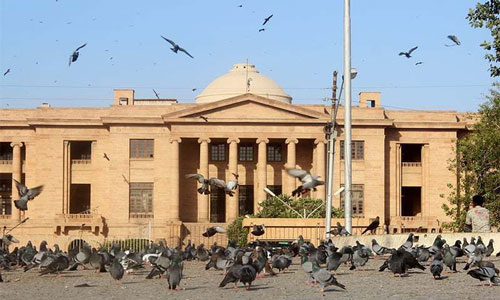The Sindh High Court (SHC) has directed the chief secretary to address the issue of lack of police stations for the registration of cases against unauthorised constructions and to ensure that additional police stations are established in each district of Karachi and all other cities of the province.The direction came on petitions against unauthorised constructions in different parts of the city.A division bench, headed by Justice Salahuddin Panhwar, observed that the process of the registration of FIRs under building control laws is not effective.
The court further observed that the Sindh Building Control Authority (SBCA) was unable to register an FIR at its own police station as it had to make a complaint at the police station within the area where the alleged unauthorised construction was being raised.It noted that there was only one police station for the SBCA for entire Karachi and no police station had been established for such purposes in other cities of the province though the SBCA had jurisdiction all over the province.The court directed the chief secretary to ensure additional police stations were established for the SBCA in each district of Karachi as well as in other cities of the province so that authority could directly register an FIR in respect of an illegal construction raised within its jurisdiction.It remarked that a large number of illegal constructions which were the subject matter of much litigation in the court indicated that the SBCA is clearly failing in its duty and illegal constructions either to have been raised on account of SBCA officers’ negligence or with its officers being complicit in permitting such illegality to occur.
The SBCA director general submitted a report in compliance with a court order, mentioning that over 64,000 approvals for constructions so far have been sanctioned by the SBCA from 2010 till now. He said that the SBCA have the right to make a complaint but they do not have the right to directly register an FIR under the provisions of the Sindh Building Control Authority Ordinance 1979.Regarding funding for the SBCA, he submitted that the SBCA is an autonomous provincial authority and it receives no funding from the Sindh government. The DG further told the high court that the SBCA holds a cash balance of Rs15 billion which has accumulated over the years. He said that accounts of the SBCA were audited by the auditor general of Sindh.Regarding a mobile application, the DG submitted that the SBCA has a mobile application which is known as SBCA smart, but it only permits a person to lodge complaints and it does not provide a mechanism on the basis of which a person can determine as to whether or not an approval for a construction has been sanctioned against a particular plot.
The court observed that the SBCA website and app were inconvenient to access as the data with regard to construction and approved building plan was both not readily accessible and also there was an extended lag in downloading such information.The court directed the SBCA to ensure that data regarding approvals accorded by the SBCA was made available, including the owner of the plot, the name of the developer and the project and the exact nature of the construction approved, on the website and the app.
It directed the SBCA to liaise and execute an MoU with the registrar of rights and assurances as well as with utility agencies to ensure that they already have access to such information at the time when registering a document or as to when they provide utility connections to such constructions.The court directed the Karachi Metropolitan Corporation and land-owning agencies to provide details of all layout plans, master plans, survey plans of plots allotted in their jurisdiction to allow such an exercise to be completed.
It also directed the SBCA to ensure that all buildings intended for commercial use, public use and meant for amenity purposes such as health and welfare uses are provided facilities for disabled persons such as ramps up to the ground floor, toilets for wheelchair-bound persons and a parking area under regulations 9-13 of the Karachi building and town planning regulations 2002.The court also told the authority to ensure that all such provisions are updated as per international standards and so as to ensure that such persons are able to get complete access to the entire building.










